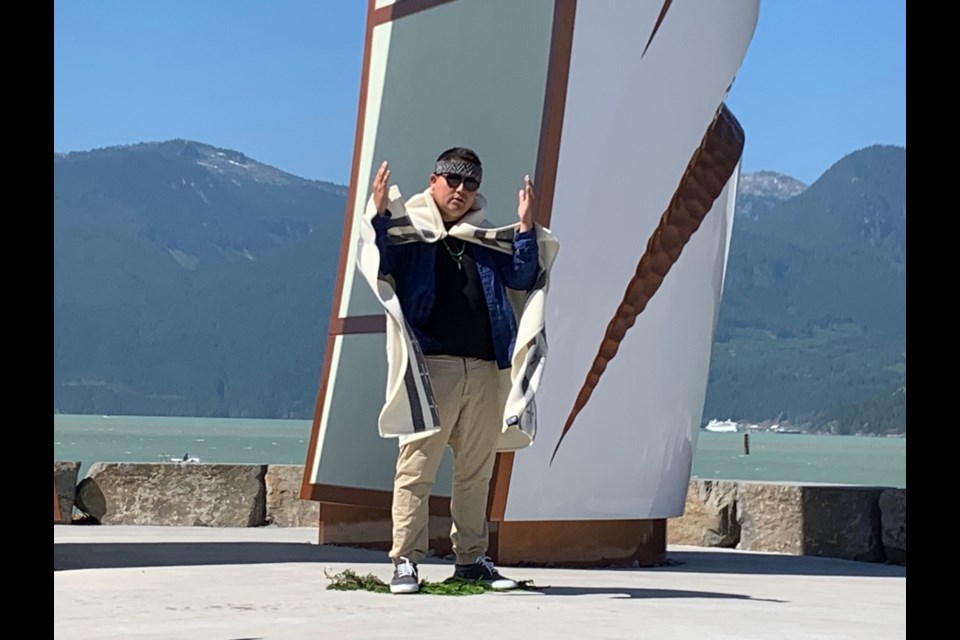Under a picture-perfect blue sky, with the Squamish wind as mighty as the ceremony, artist James Harry stood before his striking Welcome Gate sculpture during the blessing of the piece on Monday.
About 75 Sḵwx̱wú7mesh Elders, family members, dignitaries, witnesses and guests attended Sp’akw’us Feather Park for the July 15 event.
The park's developer, Matthews West, hosted the Sḵwx̱wú7mesh Úxwumixw ceremony.
Elder Bob Baker guided the event, which included drumming and singing, calling witnesses, brushing cedar boughs on the artwork and Harry, and blanketing the brushers and Harry.
Baker explained that calling witnesses passes on responsibility for the artwork's story and the ceremony.
"To take ownership of what is taking place—to have the correct information, to share the information in a good way, and also as insurance so that if we need to explain ourselves somewhere in the future, we have witnesses to cover that," Baker said, adding that it is the witnesses’ responsibility to remember accurately and correctly everything that takes place.
He noted that everyone in attendance was also asked to bear witness to the ceremony.
The brushing of the art and artist with the boughs—washed first in water from the Capilano River, is meant to ensure a continued positive journey for both.
"To make sure the journey continues in a good way by wiping any negativity or anything that might have been left here or might be in the future somewhere; we want to bring out that insurance for a good journey for the artwork," he said. "And then we want to brush the artist so that we can separate them from the work, so they can both go on their merry way in a good way."
Blanketed and standing on a cedar bough between the pillars of the Welcome Gate, Harry said he was moved by the ceremony and the sharing of culture, calling it "amazing."
He said he wants to bless every piece of his works this way.
Harry spoke of his journey to becoming an artist, starting with mentorship by his father, artist Xwalacktun (Rick Harry).
He also spoke at length about what the piece represents.
"Welcome Gate represents a gateway between the physical and spiritual world," he said. "It's meant to carry us through; it's meant to welcome us to this land; it's meant to acknowledge the land and its history."
Harry noted that if paddling in or standing to the south of the piece, between the two canoes, is Nch’ḵay̓ (Mount Garibaldi).
"Representing the story of the Great Flood and 10,000 years of storytelling through our Nation and our people, and how our people linked canoes to the top when this area was flooded out. All of our people had to link canoes together and tie in to make a big raft so that we could survive the Great Flood," he said.
He also spoke of the tradition of art in Sḵwx̱wú7mesh history and how it is honoured in the piece.
“We didn't actually have a word for art. Everything was interconnected, and we never thought of them as separate. So, with this piece, you'll see that I use three main forms on the outside of the canoe, which are the crescent, the trigon and the circle. And those are the three main forms that our people used here: all the way from Squamish down even further north—other neighbouring First Nations—as far as the northern tip of Vancouver Island, going all the way down to the Columbia River, was all Coast Salish peoples, and that design language was almost lost..”
He noted that a robust story of the piece will be added to nearby signage.
“Collaborating with James to bring this vision to life has been incredibly rewarding," said Taylor Wood, director of operations with Matthews West.
"The Welcome Gate not only highlights Coast Salish art forms in the realm of contemporary art but also embodies the essence of placemaking. This piece grounds the space, enhancing the overall atmosphere of Sp’akw’us Feather Park."
Note: Cliff Jennings' images on the Snugmug website.



